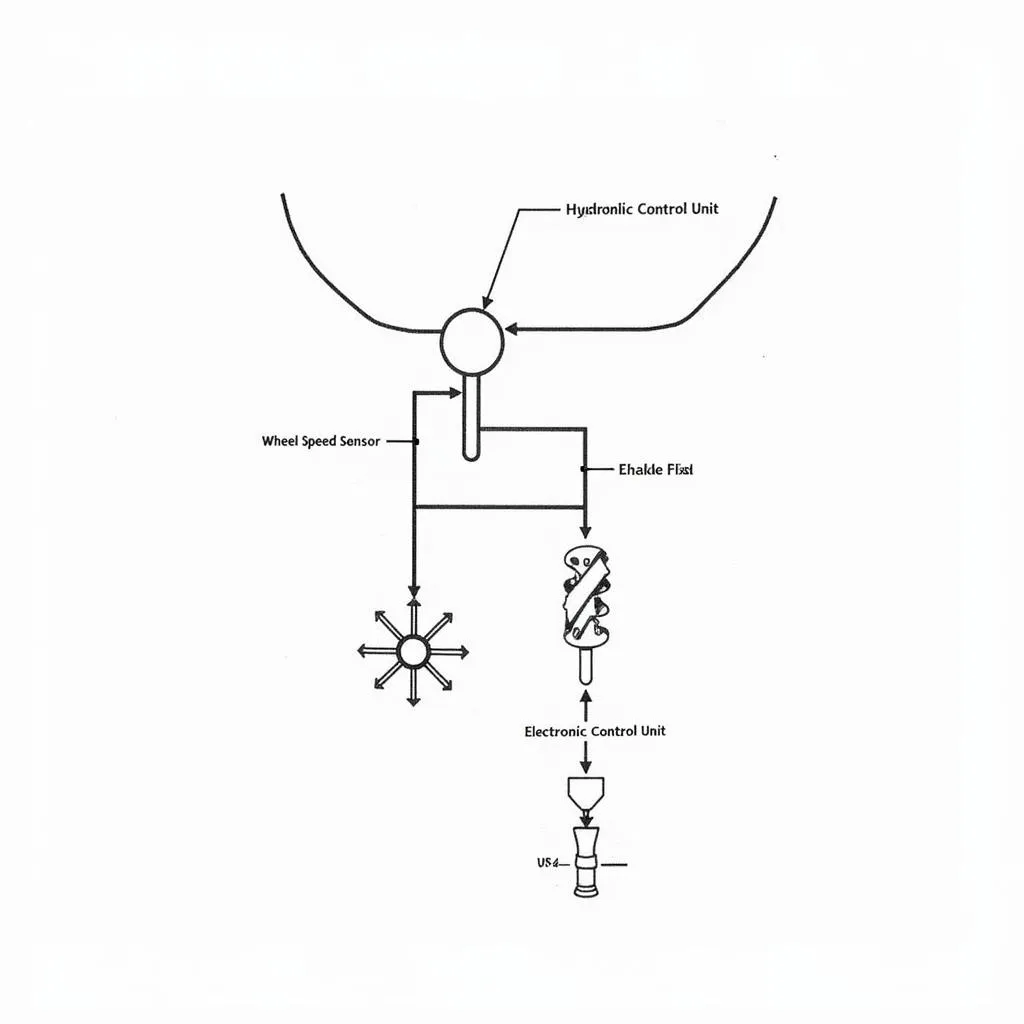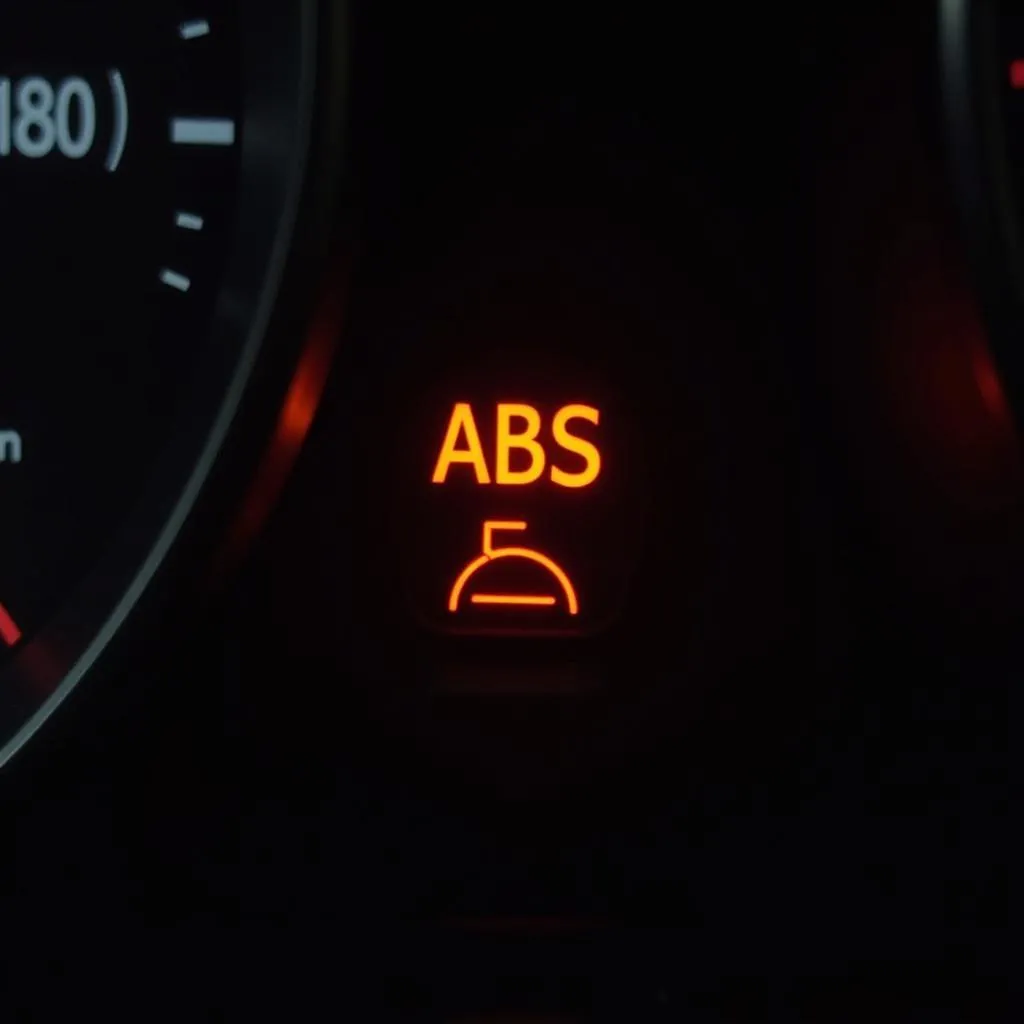Anti-lock Braking System, or ABS as it’s more commonly known, is a crucial safety feature found in modern vehicles. It helps drivers maintain steering control during hard braking by preventing the wheels from locking up. But how exactly does it work and why is it so important for your safety?
How ABS Works: From Brakes to Sensors
Imagine driving down a wet road and suddenly needing to slam on your brakes to avoid an obstacle. Without ABS, your wheels could lock up, causing your car to skid uncontrollably. This is where ABS comes in.
The ABS system relies on a network of sensors to monitor the speed of each wheel. When you brake firmly, the ABS system constantly monitors for any indication of wheel lockup. If a wheel starts to lock, the ABS system automatically modulates the brake pressure applied to that specific wheel. This rapid pumping action, done much faster than any human could manage, prevents the wheel from locking up completely.
 ABS System Components
ABS System Components
The Benefits of ABS: Beyond Preventing Wheel Lockup
The primary advantage of ABS is its ability to prevent wheel lockup, but its safety benefits extend much further. Here’s why ABS matters:
-
Shorter Stopping Distances: By preventing skidding, ABS can help reduce stopping distances, especially on slick surfaces like wet asphalt or ice.
-
Improved Steering Control: With ABS engaged, you can continue to steer and maneuver your vehicle even during hard braking, allowing you to potentially avoid an accident.
-
Enhanced Vehicle Stability: ABS helps maintain vehicle stability during emergency braking situations, reducing the risk of the vehicle spinning out of control.
ABS Warning Light: What Does It Mean?
Like most car safety systems, ABS is equipped with a warning light on the dashboard. If this light illuminates, it indicates a potential issue with your ABS system. Here are some possible reasons your ABS light might be on:
-
Faulty Wheel Speed Sensor: A damaged or malfunctioning wheel speed sensor can disrupt the ABS system’s ability to monitor wheel rotation.
-
Issue with the ABS Module: The ABS module, responsible for controlling the entire system, can sometimes experience electrical or mechanical failures.
-
Low Brake Fluid: Low brake fluid levels can affect the hydraulic pressure within the ABS system, potentially triggering the warning light.
 ABS Warning Light
ABS Warning Light
It’s important to note that while a faulty ABS system won’t typically prevent your regular brakes from working, it’s crucial to have any ABS warning lights addressed promptly by a qualified mechanic.
ABS in Action: Real-World Scenarios
Understanding how ABS works in theory is important, but let’s consider some practical examples:
-
Emergency Stop on a Slippery Road: You’re driving on a rain-slicked road when a pedestrian suddenly steps into your path. Slamming on your brakes, the ABS system kicks in, pulsing the brakes rapidly to prevent a skid and maintain steering control, allowing you to potentially steer around the pedestrian.
-
Avoiding an Obstacle at High Speed: You’re driving on the highway when the traffic ahead comes to a sudden halt. You brake hard to avoid a collision, and ABS ensures your wheels don’t lock up. This allows you to maintain control of your vehicle and potentially maneuver to a safe stop.
ABS: A Vital Safety Feature for Every Driver
ABS has become a standard safety feature in most modern vehicles, and for good reason. By preventing wheel lockup, ABS significantly enhances driver control and helps reduce the risk of accidents, especially in emergency braking situations.
Remember, if you ever see your ABS warning light illuminated, it’s essential to have your vehicle inspected by a qualified mechanic to diagnose and address the issue promptly. Your safety on the road depends on it.
FAQs About ABS
- What does ABS stand for?
ABS stands for Anti-lock Braking System.
- How can I tell if my ABS is working?
During hard braking, you might feel a pulsing sensation in the brake pedal. This is the ABS system modulating the brake pressure.
- Can I turn off my ABS?
It’s not recommended to disable your ABS system. ABS is a vital safety feature that can help prevent accidents.
- Does ABS work on all surfaces?
ABS is designed to function effectively on a variety of surfaces, including dry pavement, wet roads, and even loose gravel.
- How often should I have my ABS system checked?
It’s a good idea to have your ABS system inspected by a qualified mechanic at least once a year as part of your regular vehicle maintenance.
Common ABS Issues
Here are some common situations where you might encounter issues related to your car’s ABS:
- ABS light comes on while driving: This could indicate a problem with the ABS system, such as a faulty wheel speed sensor or a low brake fluid level. It’s important to have your car inspected by a mechanic to diagnose and fix the issue.
- ABS engages unexpectedly: If your ABS engages when you are not braking hard, it could be a sign of a problem with the ABS system, such as a malfunctioning sensor or a problem with the ABS module.
- ABS does not engage during hard braking: This could indicate a serious problem with your ABS system and requires immediate attention. You should have your car towed to a mechanic to have the ABS system inspected and repaired.
Do you have other questions? We can help.
If you need assistance with your vehicle’s ABS system, our team of experts is here to help.
Contact us via WhatsApp: +1(641)206-8880, Email: [email protected] or visit us at 276 Reock St, City of Orange, NJ 07050, United States. We offer 24/7 customer support. You can also learn more about ABS meaning and other car diagnostic topics on our website.
For detailed information on carro abs systems and how to scan ABS codes, check out our comprehensive guides. If you’re unsure about what does the ABS light mean on your dashboard, we provide in-depth articles to help you understand the different warning signals and their implications. Additionally, we have resources to help you understand what does abs mean on a car light.